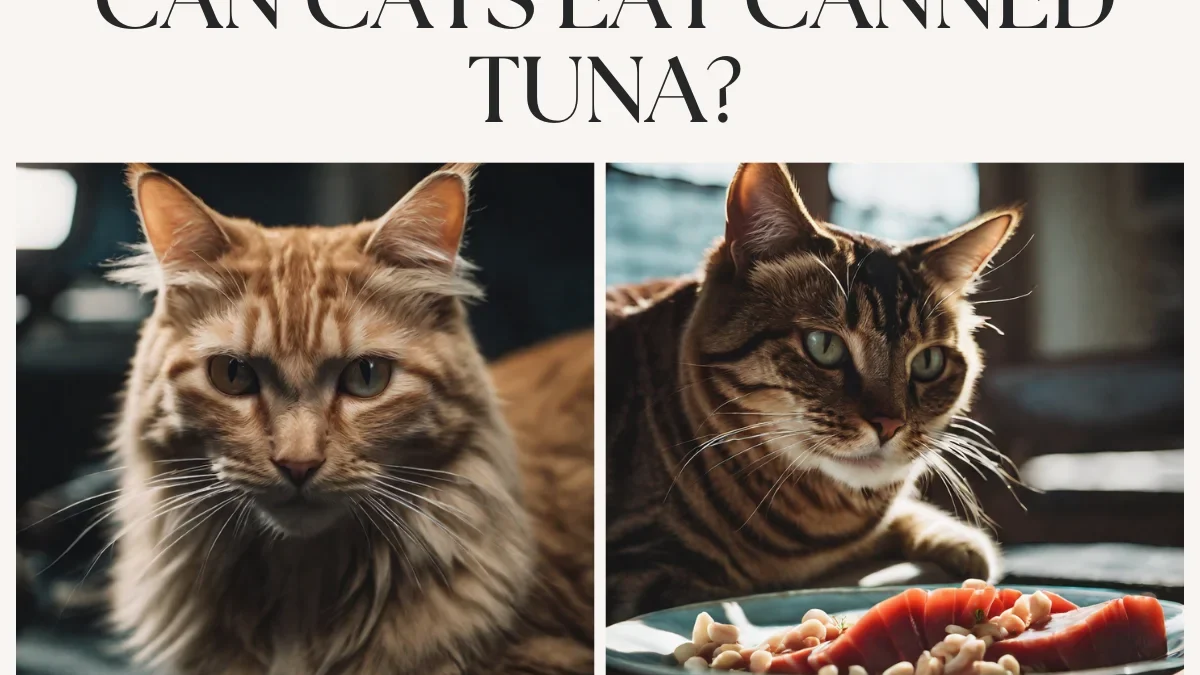Can cats eat canned tuna? This is a question that many cat owners may have pondered while preparing their meals. Tuna is a popular and convenient food that can be found in most pantries, but is it safe for our feline friends? Some may argue that cats are carnivores and therefore can eat tuna, while others believe that it can cause harm to their furry companions. In this blog post, we’ll dive into the pros and cons of feeding your cat canned tuna and whether or not it should be a regular part of their diet. So, grab a can of tuna, and let’s explore the world of feline nutrition!

Table of Contents
Understanding a Cat’s Dietary Needs
Cats are unique creatures with specific dietary needs that are essential to their overall health and well-being. To understand whether cats can eat canned tuna, it’s important to delve into what cats require in their diet.
First and foremost, cats are obligate carnivores, meaning their bodies are designed to primarily thrive on animal-based protein. Their natural prey consists of small mammals, birds, and reptiles, which provide them with the necessary nutrients they need to flourish. Unlike humans, cats cannot synthesize certain essential nutrients, such as taurine and vitamin A, so they must obtain them from their diet.
When it comes to canned tuna, cats may indeed be drawn to the strong smell and taste. Tuna is indeed a source of protein, but it lacks the essential vitamins and minerals that cats require in their diet. Feeding your cat canned tuna as a mainstay of their meals can lead to nutritional imbalances and deficiencies. It may also contribute to an excessive intake of mercury, as tuna tends to have higher levels of this heavy metal.
In addition to the lack of essential nutrients, another consideration is the high sodium content in canned tuna. Excessive sodium can be harmful to cats and may lead to issues such as dehydration and kidney problems. It’s crucial to remember that cats have different nutritional needs than humans, and what may be safe and healthy for us may not be suitable for our feline friends.
To meet their dietary needs, it’s best to provide cats with a balanced and complete diet specifically formulated for felines. High-quality commercial cat food that contains all the necessary nutrients, vitamins, and minerals is the ideal choice. Consult with your veterinarian to determine the appropriate diet for your cat, taking into account their age, weight, and any specific health considerations.

The Truth About Cats and Canned Tuna
If you’ve ever opened a can of tuna, you’ve probably been met with a chorus of meows from your furry feline friends. The smell alone is enough to make their whiskers quiver with excitement. But should you give in to those pleading eyes and offer up a bite of this fishy delight?
The truth is, cats can eat canned tuna, but it’s important to understand the potential risks involved. While tuna is a good source of protein, it lacks many of the essential vitamins and minerals that cats need to thrive. Feeding your cat canned tuna as a regular part of their diet can lead to nutritional imbalances and deficiencies.
One of the biggest concerns with feeding cats canned tuna is the mercury content. Tuna, especially certain types like albacore, can contain high levels of this heavy metal. Prolonged mercury exposure can be toxic and harmful to cats. It can lead to neurological issues and negatively affect their overall health.
Another risk is the high sodium content in canned tuna. Cats are sensitive to excessive sodium intake, which can lead to dehydration and kidney problems. Remember, what may be safe for humans can be detrimental to our feline friends.
If you do choose to give your cat canned tuna as an occasional treat, make sure it is plain and packed in water rather than oil or other additives. Be mindful of portion sizes and avoid making it a staple of their diet.
Potential Risks of Feeding Cats with Canned Tuna
Feeding your cats canned tuna may seem like a convenient and tasty option, but it’s essential to understand the potential risks involved. While cats can eat canned tuna, there are several factors to consider that could harm their overall health.
One of the main concerns is the mercury content in tuna. Mercury is a heavy metal that can accumulate in fish, especially larger ones like tuna. It can be toxic to cats when consumed in excessive amounts over time. Prolonged mercury exposure can lead to neurological issues, affecting their coordination, vision, and overall well-being. So, while it may be tempting to share your tuna salad sandwich with your furry friend, it’s best to resist the urge.
Another risk to consider is the lack of essential nutrients in canned tuna. As mentioned earlier, cats have specific dietary needs that require a balanced and complete diet. While tuna does provide protein, it lacks many vital vitamins and minerals that cats need to thrive. Regularly feeding your cat canned tuna can lead to nutritional imbalances and deficiencies, potentially impacting their long-term health.
Lastly, the high sodium content in canned tuna poses a risk to cats. Excessive sodium intake can lead to dehydration and kidney problems, both of which can have serious consequences for your cat’s health. Cats are sensitive to sodium, and what may be safe for humans can be detrimental to our feline friends.

Healthier Alternatives to Canned Tuna for Cats
While canned tuna may not be the best choice for regular feline meals, there are plenty of healthier alternatives that can satisfy your cat’s taste buds and provide them with the nutrients they need. Here are a few options to consider:
1. Cooked Fish: Instead of canned tuna, you can offer your cat cooked fish like salmon or trout. These types of fish are high in omega-3 fatty acids, which promote a healthy coat and skin for your furry friend. Just make sure the fish is cooked thoroughly, without any seasoning or added ingredients.
2. Chicken: Cats are natural carnivores, so offering them lean cuts of cooked chicken can be a great alternative to canned tuna. Make sure to remove the bones and skin before serving, as they can be harmful to cats.
3. Wet Cat Food: Opt for high-quality wet cat food that is specifically formulated for feline nutrition. Look for brands that contain real meat as the main ingredient and are free from artificial flavors and preservatives. Wet cat food provides cats with the moisture they need to stay hydrated and promotes a healthy urinary tract.
4. Homemade Treats: If you’re feeling adventurous, you can make your cat treats using cat-friendly ingredients like cooked turkey, small amounts of cheese, or pureed pumpkin. There are plenty of simple recipes available online that can cater to your cat’s dietary needs.
Remember, moderation is key when offering these alternatives to your cat. Treats should only make up a small portion of their overall diet, with the majority coming from balanced and complete cat food. Always consult with your veterinarian to ensure you’re providing your cat with the best possible diet for their individual needs.

Final Verdict: To Feed or Not to Feed?
Now that we’ve explored the pros and cons of feeding cats canned tuna, it’s time to reach a final verdict: should you feed your cat canned tuna or not?
The answer is not a simple yes or no. While it is technically safe for cats to eat canned tuna in moderation, it is not recommended as a regular part of their diet. Canned tuna lacks the essential nutrients, vitamins, and minerals that cats need to thrive. Feeding your cat canned tuna as a mainstay of their meals can lead to nutritional imbalances and deficiencies. Additionally, the mercury content in tuna, especially certain types like albacore, can be harmful to cats if consumed in excessive amounts over time. The high sodium content in canned tuna also poses a risk to cats and can lead to dehydration and kidney problems.
Instead, it is best to provide your cat with a balanced and complete diet specifically formulated for felines. High-quality commercial cat food that contains all the necessary nutrients, vitamins, and minerals is the ideal choice. This ensures that your cat is getting the proper nutrition they need to thrive.
If you still want to offer your cat a taste of tuna, it is important to do so sparingly and as an occasional treat. Choose plain tuna packed in water rather than oil or other additives, and be mindful of portion sizes. Remember, moderation is key when it comes to sharing human food with your feline friend.
In the end, it is always best to consult with your veterinarian to determine the appropriate diet for your cat, taking into account their individual needs and health considerations. Your vet can guide the best nutritional options for your cat’s overall health and well-being.
So, while your cat may be eyeing that can of tuna on the counter, it’s important to resist the temptation and opt for a healthier and more balanced diet for their long-term health and happiness.
Conclusion
After diving into the pros and cons of feeding cats canned tuna, it’s clear that while it is technically safe for cats to eat canned tuna in moderation, it is not recommended as a regular part of their diet. Cats are obligate carnivores and require a balanced and complete diet that provides them with all the essential nutrients, vitamins, and minerals they need to thrive.
Canned tuna may be a tempting option due to its strong smell and taste, but it lacks many of the necessary nutrients that cats require. Feeding cats canned tuna as a mainstay of their meals can lead to nutritional imbalances and deficiencies, which can have long-term effects on their health.
The high mercury content in certain types of tuna, like albacore, is another concern. Prolonged mercury exposure can be toxic and harmful to cats, causing neurological issues and negatively impacting their overall well-being.
Furthermore, the high sodium content in canned tuna can lead to dehydration and kidney problems in cats. Cats are sensitive to sodium intake, and what may be safe for humans can be detrimental to our feline friends.
Instead of relying on canned tuna, it’s best to provide cats with a balanced and complete diet specifically formulated for feline nutrition. High-quality commercial cat food that contains all the necessary nutrients is the ideal choice. If you still want to offer your cat a taste of tuna, do so sparingly and as an occasional treat, choosing plain tuna packed in water.
In conclusion, while cats can eat canned tuna, it should not be a regular part of their diet. By focusing on providing a nutritionally complete and balanced diet for your feline friend, you can ensure their long-term health and happiness. Remember to consult with your veterinarian to determine the best diet for your individual cat’s needs.
FAQs
Q: Is it OK for cats to eat canned tuna?
A: Cats can eat canned tuna as an occasional treat, but it should not be a regular part of their diet. Tuna lacks certain essential nutrients that cats need in their daily meals. Additionally, many canned tuna products intended for human consumption may contain high levels of salt or oil, which can be harmful to cats. If you offer tuna to your cat, ensure it is plain and in moderation.
Q: What can I feed my cat if I don’t have cat food?
A: If you don’t have cat food available, it’s best to provide your cat with a balanced and nutritionally complete diet. In such situations, options like cooked, unseasoned chicken or turkey, or a small amount of cooked eggs can be offered as temporary alternatives. However, it’s important to transition back to a proper cat food diet as soon as possible to meet their specific nutritional needs.
Q: Can cats eat raw tuna?
A: While cats are obligate carnivores and can consume raw meat, including raw tuna, it is generally not recommended. Raw fish, including tuna, may contain parasites or harmful bacteria that can cause health issues in cats. Cooking the tuna thoroughly to eliminate these potential risks is a safer option if you choose to offer tuna to your cat.
Q: Can cats eat turkey?
A: Yes, cats can eat small amounts of cooked, boneless, and unseasoned turkey meat. Turkey is often included in commercial cat foods and can be an occasional part of a balanced diet for cats. However, it’s important to avoid seasoning, bones, and excessive fat, as these can be harmful to cats. Always ensure the turkey is cooked thoroughly and remove any skin or fatty portions before offering it to your cat.

